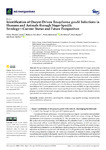2021-11-13Zeitschriftenartikel
Identification of Oocyst-Driven Toxoplasma gondii Infections in Humans and Animals through Stage-Specific Serology—Current Status and Future Perspectives
García, Gema Álvarez
Davidson, Rebecca
Jokelainen, Pikka
Klevar, Siv
Spano, Furio
Seeber, Frank
The apicomplexan zoonotic parasite Toxoplasma gondii has three infective stages: sporozoites in sporulated oocysts, which are shed in unsporulated form into the environment by infected felids; tissue cysts containing bradyzoites, and fast replicating tachyzoites that are responsible for acute toxoplasmosis. The contribution of oocysts to infections in both humans and animals is understudied despite being highly relevant. Only a few diagnostic antigens have been described to be capable of discriminating which parasite stage has caused an infection. Here we provide an extensive overview of the antigens and serological assays used to detect oocyst-driven infections in humans and animals according to the literature. In addition, we critically discuss the possibility to exploit the increasing knowledge of the T. gondii genome and the various ‘omics datasets available, by applying predictive algorithms, for the identification of new oocyst-specific proteins for diagnostic purposes. Finally, we propose a workflow for how such antigens and assays based on them should be evaluated to ensure reproducible and robust results.
Files in this item

